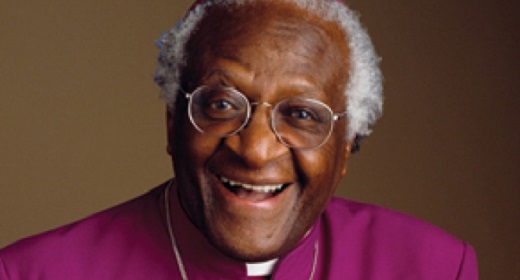By Robert Campbell: Recently, I was in the stacks at the Newburyport library searching for a book and luckily found it…
Another book was leaning against it and fell to the floor with a thud. Was this an omen, I thought, since the section was Religion?
I picked up the book and was surprised at the title, “God Is Not A Christian and Other Provocations” by Archbishop Desmond Tutu of South Africa. Needless to say, this book became my main interest because in 2000, my wife and I had joined a group of 19 under the auspices of the People to People Ambassador Program on a two-week tour of South Africa.
Our tour started in Johannesburg with a trip through Soweto, a suburb. Words fail to tell a picture of such squalor where thousands of people lived in ramshackle lean-tos, who sent children to school every day, where food was cooked in the open in large cans or pots and where few men and many women left early, before daylight, to hop on buses to take them to jobs if they were fortunate to have one.
We next visited a more upscale neighborhood in Soweto on Vilakazi Street to see the homes of two Nobel Peace Prize winners: Nelson Mandela and Archbishop Desmond Tutu. Though not side by side, they are within hailing distance of each other. We learned much about each man from this visit and their struggle against the government policy of apartheid from 1948 to the release of Mandela from prison in February 1990. The policy of apartheid was the racial, political and economic discrimination against non-Europeans in South Africa.
Leaving J-Burg, as it was referred to, we flew to Cape Town and started our tour in the notorious suburb District 6, or Sophiatown, later to be called Triomf (Triumph) by the authorities after 60,000 people of mixed race were forcibly removed from their homes in the late 1970s. The area was demolished except for three churches that stood out as far as the eye could see in an area that housed a Bohemian crowd of Afrikaaners, Indians and other mixed races.
The land, near Table Mountain, was sought by the government because it could draw a higher class of people. The inhabitants were relocated to tribal properties outside the limits of Cape Town. We were there in 2000 and though the area was still unpopulated, it was called Sophiatown once again.
According to an 1978 estimate, the government had forcibly removed 2.1 million people from their homes and planned to remove another 1.7 million. It was in Cape Town where the newly elected “black” Archbishop Desmond Tutu was denied moving into his Anglican quarters. He moved in and dared the authorities to remove him; they backed down and he remained for the full terms of his church call.
Perhaps his greatest contribution to his country and to humanity was when he was appointed to chair the Truth and Reconciliation Commission, December 1995. The purpose was to promote reconciliation and forgiveness among victims and perpetrators of apartheid by the full disclosure of truth. The commission was charged with three specific tasks: to discover the causes and nature of human rights violations in South Africa between 1960-1994; to identify victims with a view to paying reparations; and to allow amnesty to those who fully disclosed their involvement in politically motivated rights violations.
The commission’s work met almost universal approval by both parties and has served as an example for every country to follow that has had similar problems.
About the title: In his own inimitable style, Tutu reflects in a number of sermons and essays that God is not a Christian. He states that the Spirit of God existed long before there were Christians; the Book of Hebrews (1:1), for instance, asserts that God in sundry times spoke through the prophets. His concern is for all children of all faiths.
From the earliest days of apartheid he was a protester from the pulpit, in newspapers, on the radio, wherever he was granted the freedom to speak out against injustice. I was particularly struck by his comments relative to the killing of children in Sharpeville where in 1970, 70 were shot dead and in Soweto June 16,1976, when 20,000 children in school rose up in protest against an act mandating that students learn Afrikaan. The police opened fire and the official death toll was 176, but higher estimates totaled 700. That date is now a public holiday.
From that time,Tutu spoke out forcibly in terms that we know so well: Black lives matter! He used that term a number of times and, unfortunately, it rings a bell of truth whether in South Africa, Ferguson, Missouri, or Cleveland, New York City or Baltimore.
In his book, Tutu states in no uncertain terms that as a Christian, his first priority in life is to glorify and to praise God, and in that vein his sermons were provocative; they invited his listeners to take civil action. For those of you troubled by the title of Desmond’s book, I suggest you read it.
Robert D. Campbell is an essayist who lives in Newburyport.









































